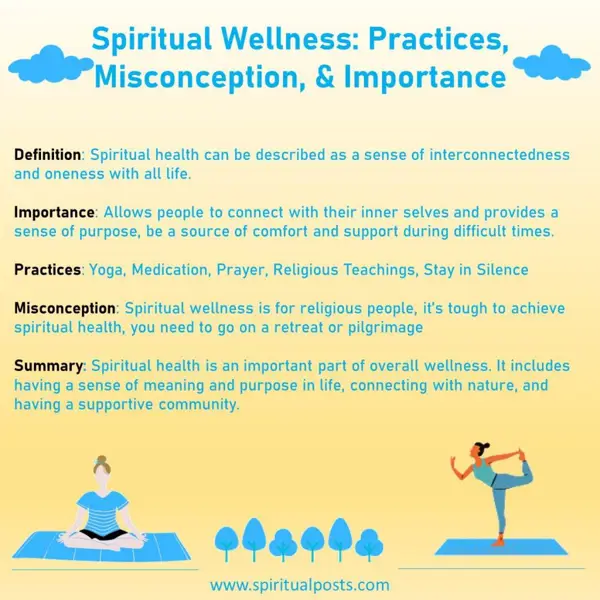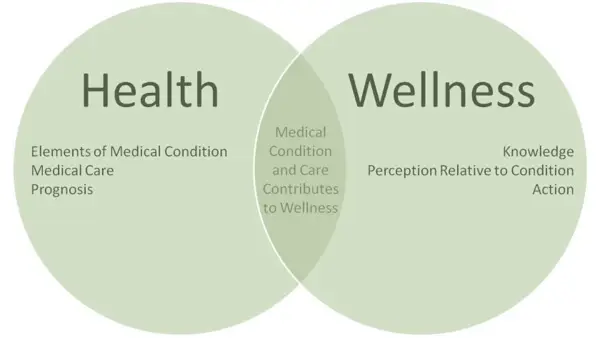Table of Contents
- Introduction
- Understanding Spiritual Health
- Exploring Emotional Wellness
- The Interplay between Spiritual and Emotional Health
- Benefits of Nurturing Spiritual Health
- Practices for Enhancing Emotional Wellness
- Conclusion
Introduction
Welcome to our exploration of the intrinsic connection between spiritual health and emotional wellness. In this article, we will delve into the profound relationship between these two facets of our being, recognizing their interdependence and how they shape our overall well-being.
Understanding Spiritual Health
Section two sheds light on spiritual health and its significance in our lives. We will examine the various dimensions of spiritual health, exploring its role in finding meaning, purpose, and connection with the world around us.
Spiritual health refers to the state of one's spiritual well-being and encompasses beliefs, values, purpose, and meaning in life. It goes beyond religious affiliation and involves connecting with something greater than oneself.
Relationship between Spiritual Health and Emotional Health
Spiritual health and emotional health are closely interconnected and can significantly impact each other.
1. Finding Meaning and Purpose: When we cultivate spiritual health, we gain a deeper understanding of our purpose and find meaning in our lives. This sense of purpose positively influences our emotional well-being by providing a sense of direction and fulfillment.
2. Coping with Challenges: Developing spiritual health equips individuals with tools and practices that help them cope with life's challenges. This can lead to increased emotional resilience and the ability to navigate through difficult times.
3. Cultivating Positive Emotions: Spiritual practices often involve gratitude, mindfulness, and compassion. Engaging in these practices promotes positive emotions such as gratitude, peace, joy, and empathy. These emotions can have a direct impact on emotional health and well-being.
4. Inner Peace and Emotional Balance: Nurturing spiritual health can contribute to finding inner peace and achieving emotional balance. It helps individuals connect with their inner selves, promoting self-awareness, self-acceptance, and a greater understanding of their emotions.
5. Social Support and Connection: Many spiritual practices involve participating in communities, such as religious congregations or meditation groups. These communities provide social support, connection, and a sense of belonging, which positively influence emotional well-being.
By recognizing the relationship between spiritual health and emotional health, individuals can prioritize both aspects to achieve overall well-being.

Exploring Emotional Wellness
Section three takes a closer look at emotional wellness. It investigates the importance of acknowledging and managing our emotions effectively, promoting psychological resilience and maintaining a healthy balance.
In our quest for overall well-being, it is crucial to acknowledge and understand the deep connection between spiritual health and emotional wellness. These two aspects of our lives are intricately intertwined, influencing and supporting one another to foster a state of optimal emotional well-being.
Emotional wellness refers to our ability to recognize, understand, and manage our emotions effectively. It encompasses aspects such as self-awareness, empathy, resilience, and the ability to handle stress and adversity. Spiritual health, on the other hand, encompasses our sense of meaning, purpose, and connection to something greater than ourselves.
While emotional wellness primarily focuses on our internal emotional landscape, spiritual health broadens the scope to encompass a larger existential dimension. It explores questions of meaning, purpose, values, and the interconnectedness of all beings. It provides a framework within which we can seek answers to life's big questions, find solace, and develop a sense of peace and harmony.
When it comes to the relationship between spiritual health and emotional wellness, they are like two sides of the same coin. Nurturing our spiritual health can positively impact our emotional well-being, and vice versa.
Here are some ways in which spiritual health and emotional wellness intertwine:
- Source of Strength: Our spiritual beliefs and practices can provide a source of strength, comfort, and hope during challenging times. Connecting with our spirituality can help us tap into inner reserves of resilience and find solace amidst emotional distress.
- Guiding Values and Purpose: Exploring our spiritual beliefs and values can guide us in determining our purpose in life, setting goals, and making choices aligned with our true selves. This sense of purpose enhances our emotional well-being, giving us a sense of direction and fulfillment.
- Gratitude and Mindfulness: Engaging in spiritual practices often encourages gratitude, mindfulness, and living in the present moment. These qualities cultivate emotional well-being by helping us appreciate life's blessings, stay grounded, and reduce stress and anxiety.
- Self-Reflection and Self-Awareness: Spiritual practices, such as meditation and prayer, promote self-reflection and introspection. This self-awareness enables us to better understand and manage our emotions, identify patterns, and make positive changes for our emotional well-being.
- Connection and Community: Spiritual communities and rituals provide a sense of belonging and connection, fostering social support networks. The support and camaraderie found within these communities enhance emotional well-being, reducing feelings of isolation and promoting positive relationships.
In conclusion, nurturing our spiritual health is crucial for cultivating emotional wellness. By recognizing the interconnectedness of our spiritual and emotional dimensions, we can embark on a holistic journey towards overall well-being, finding harmony and balance within ourselves and the world around us.

The Interplay between Spiritual and Emotional Health
In section four, we uncover the dynamic relationship between spiritual health and emotional wellness. Understanding how they influence and support one another enables us to develop a more comprehensive approach to our personal growth and overall well-being.
Spiritual health and emotional health are closely interconnected and can greatly influence each other. Understanding the relationship between the two is crucial for achieving overall well-being.
Spiritual health refers to an individual's sense of connection to something greater than themselves, such as a higher power, nature, or a sense of purpose. It involves seeking meaning, values, and a deeper understanding of life. Emotional health, on the other hand, relates to an individual's ability to recognize, understand, and manage their emotions in a healthy way.
There are several ways in which spiritual health and wellness are related to emotional health and wellness:
1. Finding Purpose and Meaning:
Spiritual beliefs and practices can provide individuals with a sense of purpose and meaning in life. Having a strong sense of purpose contributes to emotional well-being by giving individuals a reason to live, persevere, and find fulfillment in their actions.
2. Coping with Stress and Difficulties:
Spirituality can serve as a source of support and comfort during times of stress and adversity. It can provide individuals with a sense of hope, resilience, and inner strength, which helps them navigate through challenging situations and manage their emotions effectively.
3. Cultivating Self-Awareness and Mindfulness:
Spiritual practices often involve self-reflection and introspection, which can enhance self-awareness. Being self-aware enables individuals to understand their emotions better, recognize their triggers, and respond to them in a healthy manner. It promotes emotional regulation and overall emotional well-being.
4. Building Supportive Relationships:
Spirituality often involves participating in a community or finding like-minded individuals who share similar beliefs and values. Engaging with such communities can lead to the formation of supportive relationships, which positively impact emotional health. Supportive relationships provide emotional validation, empathy, and a sense of belonging, promoting emotional well-being.
5. Forgiveness and Letting Go:
Spiritual practices often emphasize forgiveness and letting go of negative emotions. Engaging in forgiveness can help individuals release resentment, anger, and other negative emotions that may be detrimental to their emotional health. By practicing forgiveness, individuals can experience emotional healing and improved emotional well-being.
In conclusion, spiritual health and emotional health are interconnected, with each significantly impacting the other. By nurturing and maintaining a healthy spiritual life, individuals can enhance their emotional well-being, leading to a more balanced and fulfilling life.

Benefits of Nurturing Spiritual Health
Section five highlights the numerous benefits that arise from nurturing our spiritual health. We discuss how a deep connection to our spiritual self can bring about inner peace, improved mental health, and enhanced emotional resilience.
Spiritual health plays a significant role in overall well-being. Nurturing spiritual health is not just about religious practices, but it encompasses a deeper connection to one's inner self and the world around them. This connection brings numerous benefits to emotional health and wellness.
1. Inner Peace
Nurturing spiritual health provides a sense of inner peace and tranquility. It allows individuals to find solace and calmness within themselves, even during challenging times. Connecting with one's spirituality helps in finding a deeper purpose in life and understanding the bigger picture, ultimately leading to a sense of peace.
2. Stress Reduction
Spirituality offers effective ways to manage stress and promote emotional well-being. Engaging in spiritual practices such as meditation, prayer, or mindfulness techniques can help individuals cope with stress and anxiety. These practices allow for self-reflection and a break from the chaotic nature of daily life.
3. Increased Resilience
Having a strong spiritual foundation enhances resilience in difficult times. Spiritually healthy individuals often possess a positive mindset, which enables them to face adversity with courage and determination. The belief in a higher power or a purpose beyond oneself instills hope and optimism, aiding in emotional recovery.
4. Sense of Purpose
By nurturing spiritual health, individuals can develop a clearer sense of purpose and meaning in life. Understanding their values and beliefs enables them to align their actions with their principles, resulting in a fulfilling and satisfying existence. Having a sense of purpose brings a profound sense of joy and contentment.
5. Improved Relationships
Spirituality fosters empathy, compassion, and forgiveness. By cultivating these qualities, individuals can build healthier and more meaningful relationships. Nurturing spiritual health promotes love, acceptance, and understanding towards oneself and others, thereby strengthening emotional bonds and promoting overall wellness.
In conclusion, spiritual health and wellness are closely intertwined with emotional health and wellness. By nurturing our spiritual selves, we can experience inner peace, reduce stress, increase resilience, find a sense of purpose, and improve relationships. Taking time to connect with our spirituality is crucial for overall well-being and leading a more fulfilling life.

Practices for Enhancing Emotional Wellness
Section six provides valuable insights into practical strategies for enhancing emotional wellness. We explore various techniques and practices that empower individuals to develop emotional intelligence, foster positive relationships, and manage stress effectively.
In order to achieve overall wellness, it is important to understand the connection between spiritual health and emotional health. While they may be distinct aspects, they are closely intertwined and influence one another. Here are some practices that can help enhance both spiritual and emotional wellness:
1. Mindfulness and Meditation
Mindfulness and meditation are powerful tools to calm the mind and increase self-awareness. These practices can improve emotional well-being by reducing stress, anxiety, and depression. Incorporating them into your daily routine allows you to connect with your inner self and achieve spiritual and emotional balance.
2. Gratitude
Cultivating gratitude enhances spiritual and emotional wellness. Taking time each day to acknowledge and appreciate the blessings in your life can bring a sense of joy, contentment, and fulfillment. It shifts your focus from negativity to positivity, boosting your overall well-being.
3. Self-reflection
Taking the time for self-reflection allows you to explore your inner thoughts, feelings, and beliefs. By understanding yourself better, you can identify any emotional issues or conflicts that may arise. Engaging in self-reflection regularly promotes personal growth, leading to enhanced spiritual and emotional well-being.
4. Seeking Support
Connecting with others who share similar spiritual beliefs or values can contribute to emotional well-being. Joining support groups, engaging in religious or spiritual activities, or seeking therapy can provide a safe space to express your emotions, receive guidance, and develop a stronger sense of belonging.
5. Engaging in Nature
Spending time in nature can be spiritually and emotionally rejuvenating. Whether it's taking a walk in the park, hiking, or simply sitting outdoors, connecting with the natural world helps in calming the mind, reducing stress, and fostering a sense of peace and interconnectedness.
Spiritual health and emotional health are interconnected and can significantly impact overall well-being. By incorporating practices such as mindfulness, gratitude, self-reflection, seeking support, and engaging with nature, you can enhance both spiritual and emotional wellness. Remember to prioritize these practices in your daily life to nurture your inner self and promote a harmonious balance between your spiritual and emotional well-being.

Conclusion
In conclusion, we recognize the profound link between spiritual health and emotional wellness. By nurturing both aspects of our being, we can cultivate a harmonious connection that contributes to a fulfilled and balanced life.
Key Takeaways
- Spiritual health and emotional wellness are intrinsically interconnected.
- Nurturing spiritual health can lead to improved mental and emotional well-being.
- Practices for enhancing emotional wellness promote overall personal growth.
Frequently Asked Questions
1. How can spiritual health impact our emotional well-being?
Spiritual health provides a sense of purpose and meaning in life, offering a strong foundation for emotional well-being. It can help individuals navigate challenges, find comfort in times of distress, and foster resilience.
2. What are some practical techniques to enhance emotional wellness?
Practical techniques for enhancing emotional wellness include mindfulness meditation, journaling, seeking professional support, maintaining healthy relationships, and engaging in self-care activities.
3. Can emotional wellness exist independently from spiritual health?
While emotional wellness can exist independently, it often benefits from the presence of spiritual health. Spiritual practices and beliefs can offer a source of solace, guidance, and self-reflection, supporting emotional well-being.
4. How does the interplay between spiritual and emotional health contribute to personal growth?
The interplay between spiritual and emotional health facilitates personal growth by promoting self-awareness, empathy, compassion, and an enhanced understanding of oneself and others. It helps individuals cultivate a sense of purpose and find fulfillment.



Recent Comments